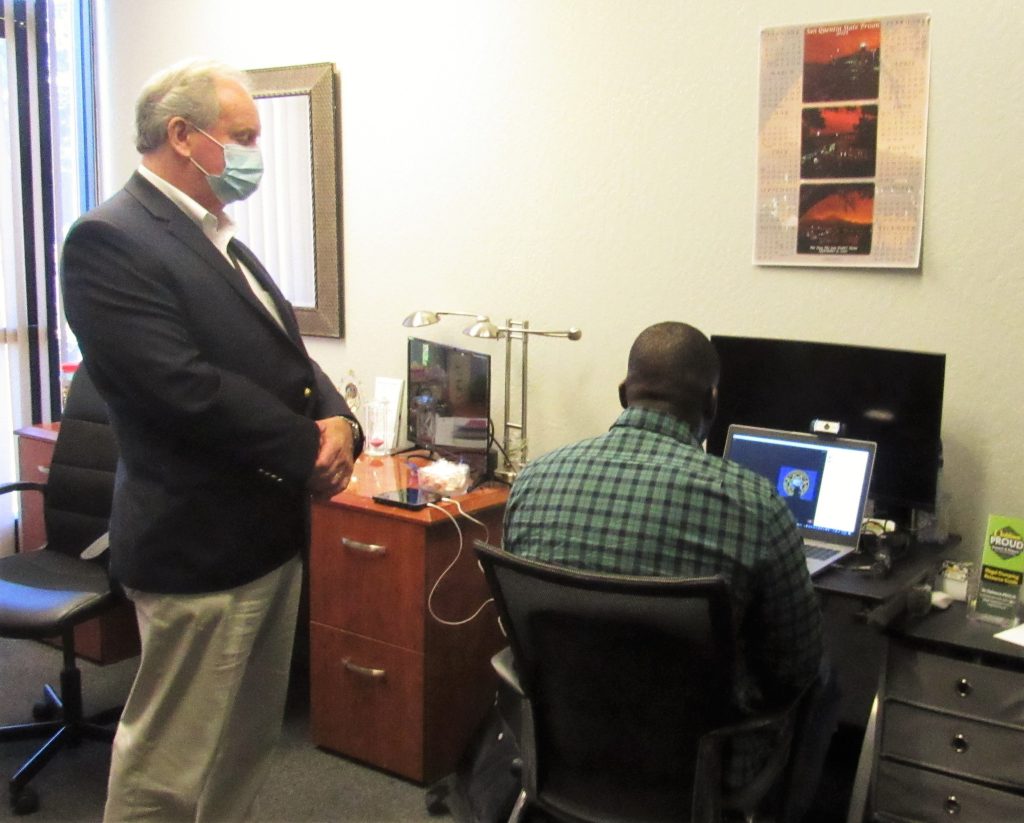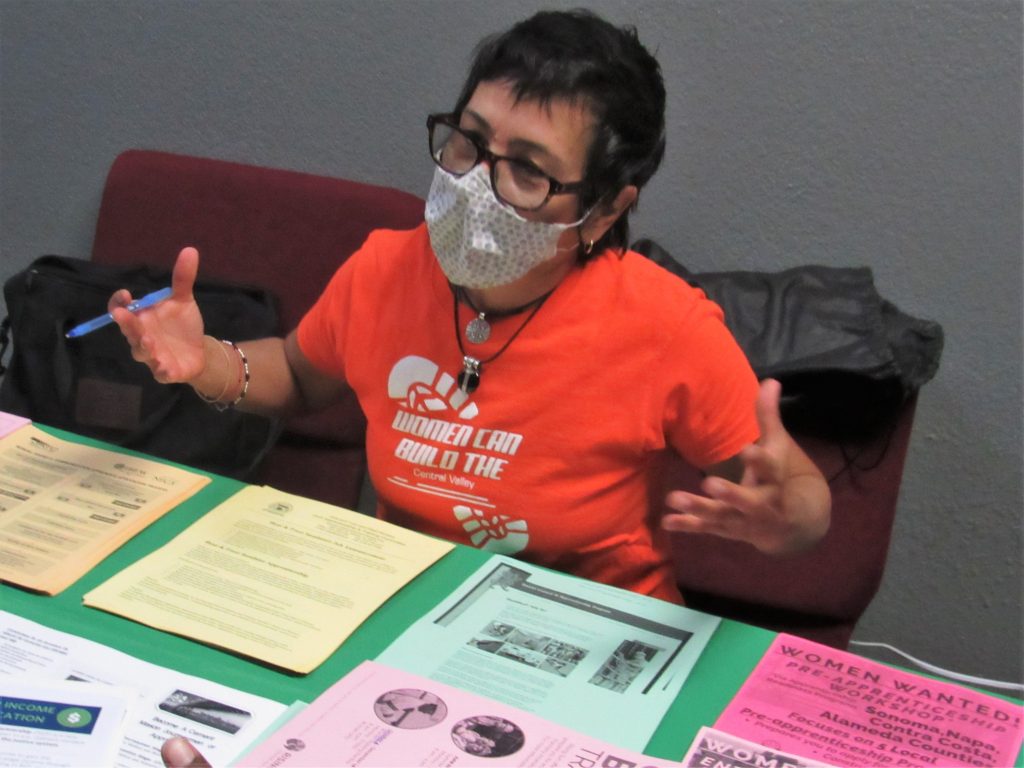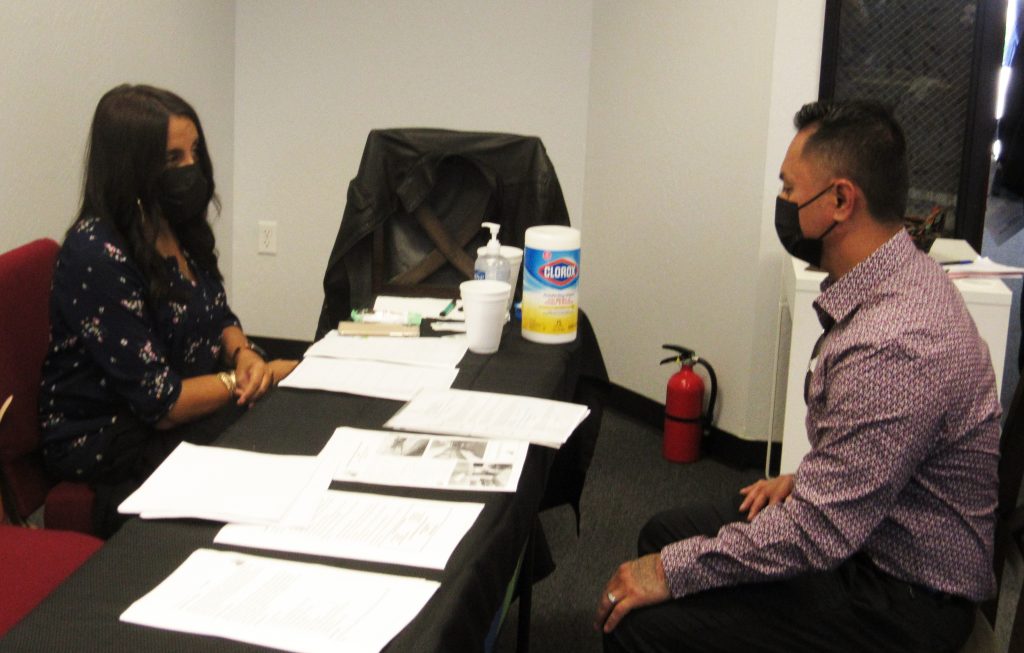Reentry Resource Centers to help formerly incarcerated people
To better serve those reentering our communities on Division of Adult Parole Operations (DAPO) supervision, CDCR is opening new Reentry Resource Centers that act as a one-stop shops for community resources. The centers offer referrals such as career counseling, pre-apprenticeship opportunities, financial literacy, education, and housing opportunities.
Former member of California’s Parole Apprehension Team, Steve Wheeler, is familiar with the needs of the parole population. He’s now a Parole Agent III and DAPO Unit Supervisor.
“It’s an evolution that’s needed,” he said. “We need to show, teach, and provide resources to people to become good neighbors.”
That’s why he advocates for one-stop, DAPO-run, reentry resource centers. The first one opened in Oakland on October 1, 2021. The Los Angeles County center opens Monday.
In Oakland, DAPO teamed up with Arsola’s, a nonprofit distribution center and community services provider who offered their building to house the unique program.
DAPO Oakland Reentry Center is open five days a week, four hours a day, with plans to extend hours as participation grows. DAPO parole agents are in charge of recruiting community resources that will have a place at the RRC. The community service providers will rotate shifts to help facilitate citizens’ successful returns into their community.
To ensure the services are easily accessible, it’s just a short walk away from the main Oakland parole office.
Securing a facility was only the first step

A new participant at the Oakland Reentry Resource Center goes online with the help of a service provider and registers for essential identification while learning to access the internet. 
Ester Sandoval represented Tradeswomen Inc. at the Grand Opening of the Oakland Reentry Resource Center on October 1. She teaches women who are looking for a good-paying job in construction or other trades break barriers. 
Reentry participant Romeo Bacos (right) is thankful to parole agents and service providers for the advice and help he’s getting as he begins a new phase of his life. He’s inquiring about housing options for his growing family.
Parole Agent II Tonia Wells, also known by Alameda County Services as the “walking encyclopedia,” was instrumental in bringing together DAPO and Arsola’s to secure a facility for the Reentry Resource Center.
“I feel really good about the center opening,” Agent Wells said. “We had one person come in and he needed a birth certificate, a housing placement, and employment. We were able to connect him to all that.”
The goal is to ensure people on parole supervision have the tools they need to be productive citizens and remain crime-free. They advise, inform and teach people about available resources as well as crucial life and job skills they’ll need. For example, some of the people currently on parole may have been in prison before computers became commonplace. At the grand opening, participants went online with the help of tech-savvy trainers who taught them how to navigate the internet.
Employment help plays a large role
Non-profit community providers like the West Oakland Job Resource Center offer pre-apprenticeship programs for good-paying union jobs. According to Executive Director Joyce Guy, they also offer career counseling, employment and financial services.
Due to staff shortages in many industries, Guy said this is a great time for people to find work.
Ester Sandoval from Tradeswomen Inc. specializes in helping women break through barriers to obtain apprenticeships in construction and other trades. Homeless parolees and other at high-risk of becoming transients can get housing assistance, and placement in city or county services.
Rehabilitation is key to successful reentry
On opening day in Oakland, about 20 service providers were on hand to help. In all, more than 40 parolees received assistance at the Center in just the first two hours. One of them was Romeo Bacos, who paroled in 2020. The 43-year-old’s eyes teared up when he described how much his life had changed since he focused on his rehabilitation.
“I feel they’ve really helped me,” Bacos said.
Looking back, he realizes his new way of living is helping him attain goals he always had, but sometimes thought he might never achieve. Now, he has a strong need and desire to stay on the right track as he and his wife are newly expecting a child.
Services help paroled individuals reenter community
Jesse Vasquez, who released in 2019, understands why access to these services can make a major difference.
“It’s important for people to start off on the right foot,” Vasquez says. He’s been in that situation himself, now he is becoming a role model for others like him. On the morning of the reopening, he achieved another milestone in his own reentry. He received the phone call he had been anxiously awaiting for more than two years. “I got discharged from parole today,” he exclaimed.
Vasquez made a name for himself in prison. His straightforward attitude and honesty propelled him to Editor-in-Chief of the San Quentin News, a newspaper produced by incarcerated journalists in San Quentin State Prison. His rehabilitative and educational success in prison earned him attention from former Governor Edmund Brown Jr., who commuted his two life sentences to 15-years-to-life with the possibility of parole. The Board of Parole Hearings found him suitable for parole in February 2019.
Helping from outside
Now, he still helps support the paper as Director of Development for the Friends of the San Quentin News. The newspaper’s reach has extended to other prisons statewide.
He was the voice of the inside, even getting an opinion article into the Washington Post in 2018 about racism in prison. Now he’s proudly helping make the voices heard on the outside. He works at Arsola’s as a program manager for reentry services. When staff look for solutions for providing services and reinforcing honesty and good decision-making, they turn to Vasquez for ideas and feedback.
“It’s great to see CDCR is being more proactive. It used to be that community-based organizations would take the lead in providing services. But now CDCR is making it a one-stop-shop,” Vasquez said.
At the Oakland Reentry Center, DAPO agents and administrators, and people who have previously been on parole supervision have formed a trusted team to find better ways to help people adjust on the outside.
Dispelling myths is key.
“For me, having heard stories about parole being retributive and vindictive and that they are just trying to send everyone back to prison, it was eye-opening. Instead, I see a wave of support from parole agents, service providers and staff. It’s heart-warming and encouraging. We’re turning a new leaf in reintegrating people who have been gone from the community for decades,” said Vasquez.
Adult Program Unit put in the work for new services
Unit Supervisor Wheeler couldn’t agree more and praised his staff in the Adult Program Unit for their hard work. The unit includes Parole Agent II Tonia Wells and Parole Service Associate Sonia Sandoval, who Wheeler says were crucial in coordinating the reentry center’s opening. He also gave kudos to Deputy Chief Administrator Jamal Rowe, Parole Administrator Ryan Youtsey, and Parole Agents II Dina Aguilar, Goeffrey Reisland, and Art Valdez. He thanked them all for their support and guidance.
Wheeler says getting the Oakland Reentry Resource Center up and running is a career highlight.
“It’s rewarding because you’re showing the people on parole supervision there is a different way, you’re proving we can break the cycle. It’s great when you see that they get it, when you see them progress by looking for employment, or you get them into training,” Wheeler said.
“That’s when you can see things click and now they’re on a routine; staying busy and productive. Seeing each step is amazing; seeing them get paid, graduating from apprenticeship programs, realizing they’re on a career path, that’s what helps them become a stable and productive family member. You get to see it from beginning to end. It’s really rewarding.”
Current and soon-to-open locations
The Reentry Resource Center at Arsola’s Distribution Center at 7801 Edgewater in Oakland, California is the first DAPO-run center of three currently opening. On November 1, DAPO will be opening the Los Angeles Central/Mid-city Reentry Resource Center at 2444 S. Alameda. In mid-November, a third reentry center at the Stockton Parole Office, 612 Carlton Avenue, will also open. More centers are in planning stages statewide.
By Luis Patiño Jr., Office of Public & Employee Communications